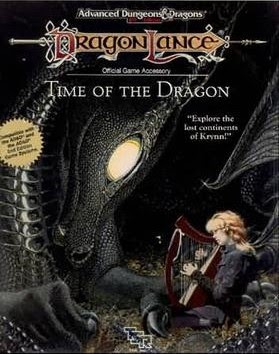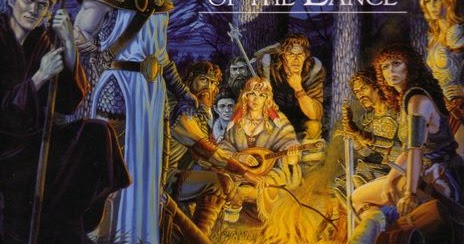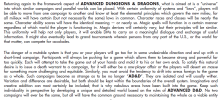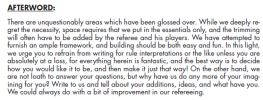Voros
Doomed Investigator
- Joined
- Sep 23, 2017
- Messages
- 15,243
- Reaction score
- 33,476
A good summary. But you conflate the OSR with the associated rule systems. The OSR was a reaction against WOTC's D&D (streamlined? ROTFL). For example, Grognardia was a blog about D&D - not a blog about retroclones. I never personally even played a clone until OSE.
Except that from a historical perspective clearly G1-3 did introduce naturalism into D&D (prior to this adventures had a tendancy to contain killer rabbits,, meat ball monsters covered in gravy, and giant pigeons), I sold the first Dragonlance module in disgust when I got it because it was such a railroad (and never bought another TSR module), and indeed the period up until that point has a fantastically high hit rate of classic products, whereas immediately afterwards (when their module output doubled) you get such classics as The Forest Oracle. After that it was MERP/Rolemaster for me and I didn't revisit D&D for 25 years. So there's actually a lot of truth in those statements...
Except that OD&D (with the supplements and Strategic Review of course) is extremely close to AD&D. I'm sure that a majority of OD&D players used Monster Manual at the time, and all the spells and magic items can be viewed as optional extras for OD&D (that's how I use them and I'm far from alone). I'm sure many just ignore all the OTT rules (just like the hit locations in Blackmoor) such as the initiative system or weaopn speed or spell components.
Of course any movement attracts cranks, and while the "rulings, not rules" doctrine is a brain child of some strands of the OSR, it does not describe any version of D&D (even the original 3BB).
Somebody somewhere in this thread said something (which I can't now find) which reminded me that just as the OSR was given life by 3E (both as a reaction against it, and also helping it with the OGL) and given the boost it needed with the nose-dive popularity of 4E, and Pathfinder was caused by 4E, it was the success of the OSR which led to the design of D&D 5E (Pathfinder meant it was needed, the OSR showed the direction to take) and hence the amazing uptake in enthusiasm of D&D I see today. Without Pathfinder and the OSR it would likely have withered on the vine. Amusingly I've seen people who've only ever played 5E say they don't understand the need for the OSR. It's like all the people who love Tolkien-inspired fantasy or Led Zeppelin-inspired music who then say they don't see the point of the original.
JMal claimed, with no cursory let alone close reading, that DL 'ruined D&D' and similarly hyperbolic, perhaps even hysterical claims in a polemic that many took as the Gospel truth because it 'felt right.'
Yet he recently posted an appreciative review of David Cook's Time of the Dragons.

Retrospective: Time of the Dragon
When I first started writing these Retrospective posts, I set myself some broad historical parameters, in order to pare down the absolutely...
So as I suspected and argued on this very forum with an infamous OSR narcissist, JMal was clearly speaking polemically but many of his fans took him literally.
Post in thread 'OSR Guide For The Perplexed Questionnaire' https://www.rpgpub.com/threads/osr-guide-for-the-perplexed-questionnaire.2026/post-61825
Much more useful than JMal's sweeping declarations are the numerous, excellent blog posts on DL by the designer of Into the Unknown, which starts here:

Dragonlance was a Unique Sandbox
My OSR Blog about fantasy world building and rules analysis for D&D. Also home of the B/X inspired 5e-clone "Into the Unknown."
Or Justin Alexander's extensive close reading of the original DL modules here:
I find far too much loose talk on OSR and other rpg blogs with little to no sourcing.
Outright false claims that a simple reading of the text would refute are popularized and spread across the net. One recent example is the widely repeatsd and clearly false claim that the 5e Spelljammer books didn't come with rules for ship-to-ship combat.
At the very least take the time to read if not play something before reviewing it.
JMal's post closed minds and drew lines whereas Anders and Justin's posting takes a more nuanced and historical approach.
Instead of dismissing something wholesale, as the OSR complains constantly happened to older editions of D&D, they revisit with a cooler head and ask what there is of value in DL.
An approach that JMal's most recent post suggests he may be coming around to.
Last edited:








 !
!
 )!
)!
 !
!
